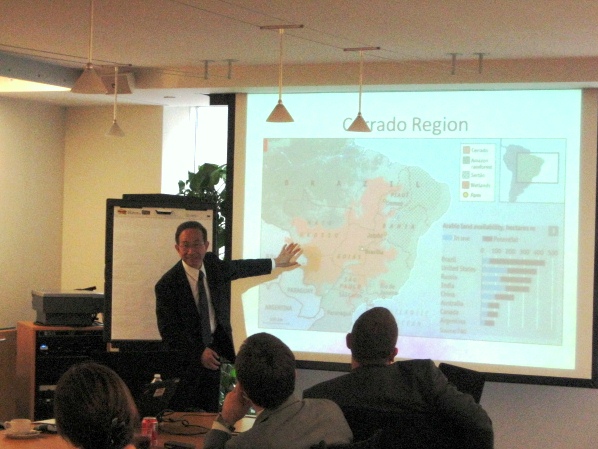JICA-RI Director Gives Presentation at the World Bank Seminar
2012.07.10
On June 22, JICA-RI Director Akio Hosono gave a presentation on the Brazilian Cerrado agricultural development at a seminar held by the World Bank in Washington, D.C.

JICA-RI Director Akio Hosono at the seminar
The World Bank Rural Policy Thematic Group, the Offices of the Japanese and Brazilian Executive Directors jointly hosted this event. The seminar was attended by the World Bank staff members who are directly involved with rural development, H.E. Amélia Matos Sumbana, Ambassador of the Republic of Mozambique to the United States of America, and other government officials.
The World Bank has shown interest in studying the potentiality of African agricultural development, drawing on the experiences in agricultural development of the Cerrado in Brazil and that of north-eastern Thailand. Its report based on this study has already been published. Spurred by the JICA’s comprehensive research on the Cerrado agriculture, this seminar was organized, with the exchange of opinions with the World Bank researchers in the field of agricultural development.
In his opening remarks, Nobumitsu Hayashi, Executive Director for Japan at the World Bank, noted that this is a good opportunity for the World Bank to learn from the experience of the Japan-Brazil Cooperation Program for Agricultural Development (PRODECER), as a successful example of a project through long-term bilateral cooperation.
Natalia Speer, Senior Advisor to the Executive Director for Brazil, also pointed out that the Cerrado in Brazil is not widely known, while everyone knows about the Amazon rainforest. She stated in the hope, “This research of JICA-RI would be utilized as a case example of achieving economic growth and environmental protection, as well as the key to success for the tripartite cooperation among Japan, Brazil, and Mozambique, which further development is expected in the future.
In his presentation, Director Hosono explained the two factors of the Cerrado agriculture success as an inclusive development: 1) technological innovations such as cross breeding suited for the tropical climate and soil improvement, and 2) institutional innovations that involved the government and the private sector. He went on to explain with data that the Cerrado development brought agricultural production as well as development of agri-business through creation of value chains, and the processes of redressing regional gap through job creation.
Willem Janssen, Lead Agriculturist, Latin America and Caribbean Agriculture and Rural Development Unit, valued Director Hosono’s presentation as being comprehensive and detailed, while pointing out that investment in the study of agricultural sector in developing nations remained low, especially in Africa. He hoped that partnership out of South-South cooperation would contribute to filling in the gap at the research level.
Michael Morris, a specialist in the World Bank’s regional department, inquired the possibility of agricultural development among small-scale farming households in Africa, stating that job creation was the greatest concern in many areas of Africa including Mozambique.
Director Hosono responded to this question that one of the factors behind the generation of jobs in the Cerrado was the formation of value chains including a diverse range of processed agricultural products: not only exporting unprocessed soybeans as primary product, but giving added value by processing soy oil or soymeal, and then giving greater added value by blending them with corn or other ingredients for livestock feed. Director Hosono added that the value chains contributed to the expansion of job opportunities and production of labor-intensive fruits and vegetables.
The Cerrado is an extensive farmland, but is not widely known. This special seminar, therefore, received a high recognition as being significant and timely.

事業事前評価表(地球規模課題対応国際科学技術協力(SATREPS)).国際協力機構 地球環境部 . 防災第一チーム. 1.案件名.国 名: フィリピン共和国.

事業事前評価表(地球規模課題対応国際科学技術協力(SATREPS)).国際協力機構 地球環境部 . 防災第一チーム. 1.案件名.国 名: フィリピン共和国.

事業事前評価表(地球規模課題対応国際科学技術協力(SATREPS)).国際協力機構 地球環境部 . 防災第一チーム. 1.案件名.国 名: フィリピン共和国.

事業事前評価表(地球規模課題対応国際科学技術協力(SATREPS)).国際協力機構 地球環境部 . 防災第一チーム. 1.案件名.国 名: フィリピン共和国.

事業事前評価表(地球規模課題対応国際科学技術協力(SATREPS)).国際協力機構 地球環境部 . 防災第一チーム. 1.案件名.国 名: フィリピン共和国.
scroll